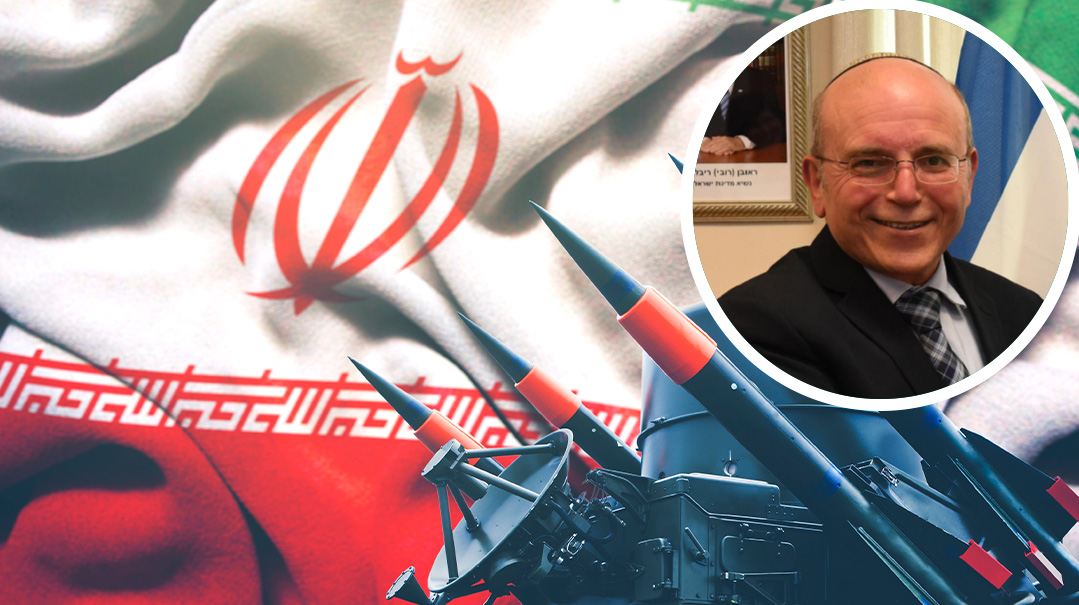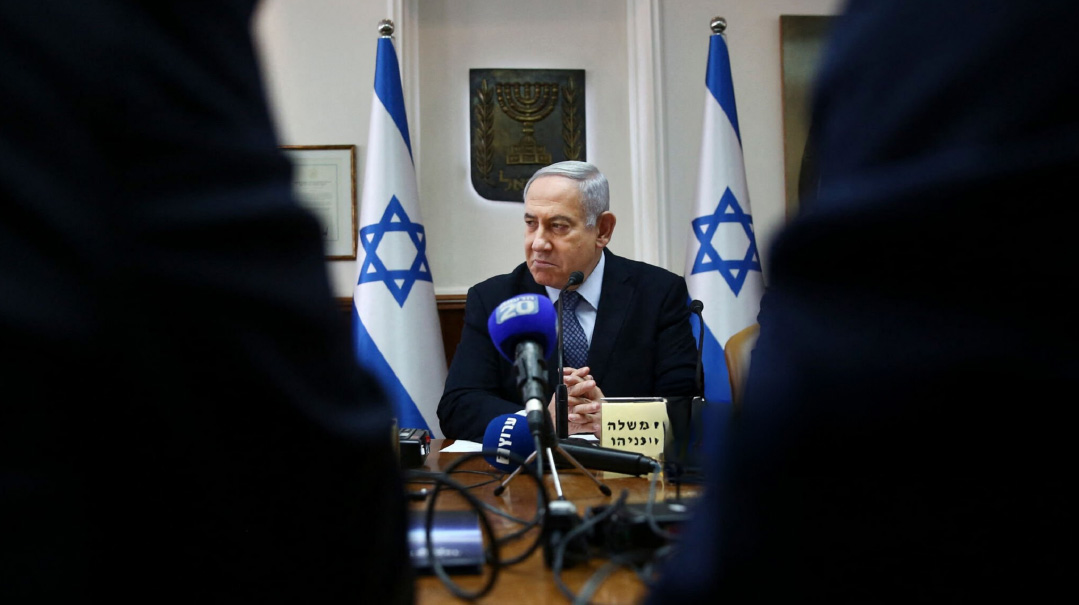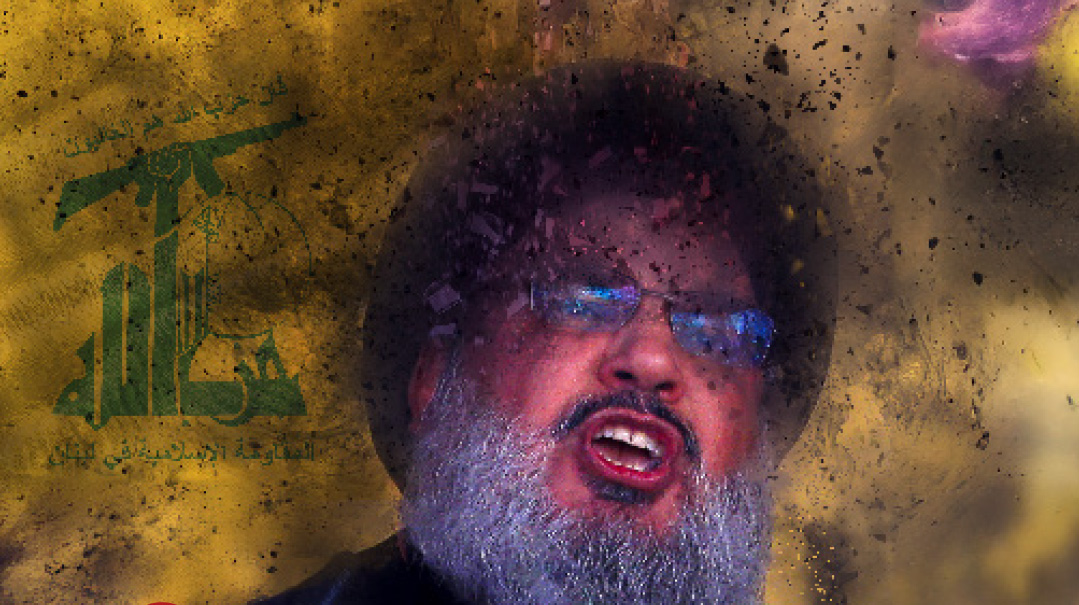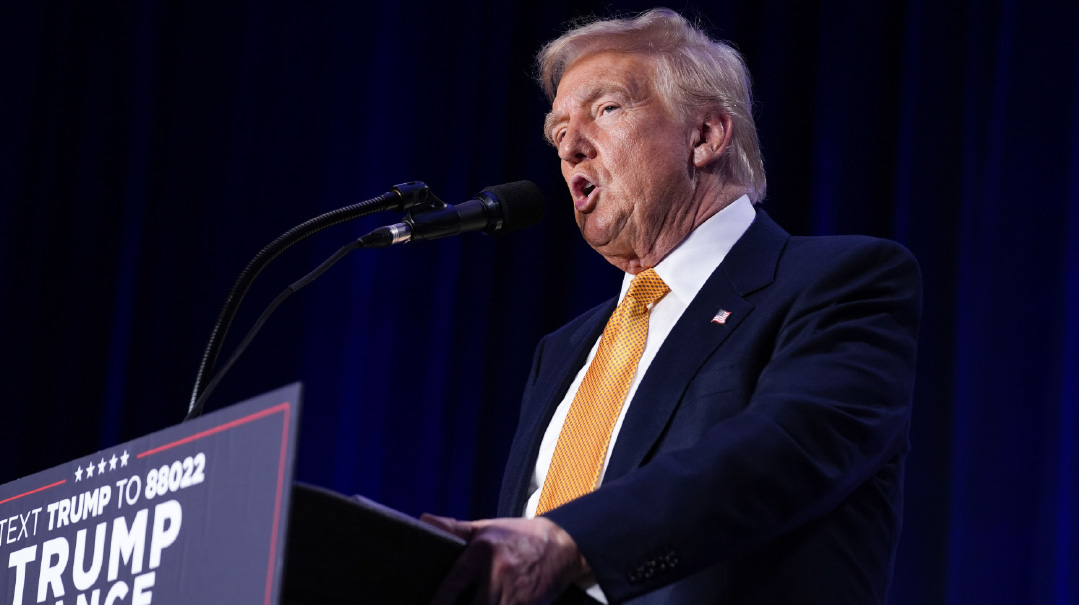The Iran File

Spymaster Meir Ben Shabbat warns of Iran deal surrender

The Russian invasion of Ukraine has drawn the world’s eyes away from some alarming developments regarding Iran.
In a few days, Major General Amikam Norkin will end his term as commander of the Israeli Air Force and retire from the IDF. In off-the-record conversations ahead of his departure, he speaks openly about the war being waged against Iran and its proxies, the so-called “Campaign Between the Wars.”
The conflict, which has yet to receive a name, is becoming more and more public. It is fought 24/7 in air, sea, and land, as well as in cyberspace. It is fought in Iran, Iraq, Yemen, Eritrea, Syria, Lebanon, Gaza, and other areas, directly and through proxies. At any moment, any success that is too dramatic or well-publicized, by either side, risks igniting a major war.
The official theater of operations for now is Syria, an area where Israel is in rare agreement with Russia and Assad on expelling the Iranians. But in the past few weeks, the war has expanded. Two weeks ago, Tehran accused Israel of launching a strike on a drone base in western Iran, in which two Iranian soldiers were killed. In retaliation, the Iranians attacked a target they claimed was a Mossad base in Erbil, Iraq. At the same time, the Iranians launched a wide-ranging cyber-attack on Israeli government websites and leaked personal documents of current Mossad chief Dudi Barnea and his family, including his tax papers for 2020.
Iran is currently Israel’s leading and most dangerous enemy. For decades they’ve been arming proxies and providing them with weapons and cash. In addition to conducting a war both behind the scenes and in front of the curtain, watching the nuclear talks in Vienna, and maintaining the option of military strikes on the nuclear facilities, Israel is working to build up and strengthen an alliance opposed to Iran, with the aim of countering them on the intelligence, operational, and technological fronts.
This is what lies behind IDF chief of staff Aviv Kochavi’s visit to Bahrain, President Isaac Herzog’s visit to Turkey (which shares an important land border with Iran), and the visits of other Israeli officials to important countries in the region in the past few weeks. According to sources in the Defense Ministry, this multi-branched activity, being carried out both in the open and in secret, is important for isolating Iran, and no less so for providing Israel with the necessary legitimacy in the region if and when it becomes necessary to take military action.
One man who has knows a thing or two about ongoing events in Iran, as well as in Russia, Syria, and the Gulf States, is Meir Ben Shabbat, until recently Israel’s national security advisor and chief of staff of the national security council. Before that, he served for many years as head of the Shin Bet’s Southern Region. Today he’s a senior visiting research fellow at the Institute for National Security Studies at Tel Aviv University.
In a conversation with Mishpacha, he says: “Iran is responsible for most of the problems in the region as a whole. It undermines stability. Its tentacles extend into Lebanon, Syria, Iraq, Yemen and the Gaza Strip. It poses a multidimensional threat: in terms of the bomb, regional aggression, cyber, and terror. The attention we gave it was in proportion.”
Will a new nuclear deal be signed with Iran, in your opinion?
“Sadly, what’s on the table isn’t a new deal. It’s a return to the old deal, with all its failings. At this stage the powers have decided to stop talks temporarily due to new demands raised at the last moment. This gives the United States an opening to leave this terrible path and try to reach ‘a longer and stronger deal,’ as originally intended. However, it seems that the fervor to finally put this issue to rest with a deal of some type is overriding the impulse to find a solution that will genuinely prevent Iran from becoming a nuclear power.”
What are the ingredients of a good deal?
“A deal is not an end in itself, but a means to an end. The goal is to permanently prevent Iran from being a nuclear power or a latent nuclear power. A good deal needs to include every ingredient that ensures this — taking away production capabilities, taking away weapon capabilities, effective and unrestricted inspection of all the facilities, immediate responses to any violation, and no expiration date. (The goal has to be to permanently prevent them from getting the bomb.) In addition to the nuclear dimension, the deal also has to rein in Iranian proxy aggression and terror sponsorship in the region.
“In reality, the deal about to be signed paves the way for Iran to become a latent nuclear power as soon as the restrictions expire. It allows the Iranians to achieve far more than they expected in the framework of a deal (as the Russian envoy to the Vienna talks admitted), and also frees up many billions of dollars, which they can use to build up their strength and continue their aggression in the region. It’s an embarrassing deal.”
Given that Iran is much closer to a bomb than it was in 2015, was the strategy of convincing Trump to exit the nuclear deal flawed?
“No. As I said, the deal isn’t an end, but a means. If it doesn’t achieve the goal of preventing a nuclear Iran — it’s better to exit it than to think it represents a solution.
“The Iranian regime will give up the nuclear project only when it’s faced with a choice between doing so and losing power. The sanctions could have achieved this goal if they were maintained with even greater intensity alongside a credible military threat. Basically, the Trump administration left the Biden administration significant leverage on Iran. The use of that leverage should have continued — it could have broken the Iranians’ spirit, as they were only holding out for the change of administrations to ease the sanctions.”
At this stage, is no deal worse than a bad deal?
“Absolutely not. This deal paves a path for Iran to become a latent nuclear power when the restrictions expire. It also frees up a lot of their money, lifts sanctions, and allows them to recover after a period of crippling pressure.”
Does the current administration have what it takes to be tough with Iran?
“Although the world has made progress and decries the use of force, we have to remember that weakness invites evil. If good isn’t strong, it won’t be able to contain evil. This is always true, and it applies in our era as well.
“America’s allies in the Middle East are watching her behavior on the important issues of the day. Their conclusions aren’t favorable and won’t improve America’s standing in the region.
“If a deal is signed with Iran, other nations in the region will try to get a bomb to create a counterweight to Iran. None of this will contribute to regional stability…”
As a side note, Ben Shabbat’s words were reinforced over the weekend by General Kenneth McKenzie, commander of the United States Central Command, who said last Friday: “Iran is dedicated to the destruction of Israel. That’s a matter of public record, they’ve said it many times. So I think it’s obvious that Israel is going to take steps to defend itself when it’s confronted with Iranian actions. I do worry about these exchanges between Iran and Israel, because many times, our forces are at risk, whether we’re in Iraq or in Syria.”
The general was speaking at a press briefing for Pentagon correspondents — his last, as he’s expected to retire soon after three years on the job. McKenzie, who oversaw the US Army’s chaotic withdrawal from Afghanistan, as well as the elimination of ISIS, said his most important message for his successor is that Iran will continue to be the Central Command’s main challenge.
“There were other problems, other huge problems, but the headquarters as a whole focused on the Iranian problem and everything attended to that,” Mackenzie emphasized.
Mr. Ben Shabbat, what’s your opinion on the Biden administration’s emerging decision to remove the Iranian Revolutionary Guard Corps (IRGC) from its terror blacklist?
“I think it’s a distortion of the truth and the adoption of a double standard that discriminates between terror groups. It’s a surrender to Iran and a gift to the biggest terrorist force of our time, which sows ruin in the Middle East and throughout the world, from Lebanon to Argentina. It’s also a blow in terms of public perception and makes things difficult for Israel and America’s other allies in the region, who have to deal daily with terrorist schemes concocted by the IRGC.”
Maybe it’s a tactical move by the administration meant to elicit a refusal, so they can adopt a tougher stance?
“If it weren’t for the Biden administration’s record, there might be room to suspect that it’s meant to blunt criticism of their surrender to Iran’s dictates. Sadly, it’s hard to take this possibility seriously, when you remember the words of Michael Ulyanov, the Russian envoy to the Vienna talks, to the effect that Iran has extracted a much better deal from the US than even they expected.
“In addition, the decision to remove the IRGC from the terror list doesn’t seem so strange when you remember that one of the Biden administration’s first actions was to remove the Houthis from the same list two days after their most recent attack on Saudi Arabia. And the administration refused to return the Houthis to the blacklist even after further terror attacks, once again directed against the UAE.”
Is there a message here to Israel to avoid taking military action against Iran?
“The Iranian Revolutionary Guard Corps was established by Khomeini in 1979 as a counterbalance to the regular army — whose commanders he didn’t trust because of their American education and closeness to the Shah. It is organized along the lines of an independent military. It has land, air, and naval branches, a special forces unit called the Quds Force, an intelligence arm, as well as the Basij Force, which is responsible for public security and the suppression of political dissidents. The IRGC also operates the regime’s ballistic missile arsenal.
“The IRGC serves not only as the mainstay of the ayatollah regime but as its main instrument for implementing its grandiose vision of establishing Iranian hegemony in the region and spreading the ideals of the Islamic revolution around the world.
“The Guard’s Quds Force is responsible for all extraterritorial operations, including the Shiite militias outside Iran’s borders. Its tentacles extend into Iraq, Syria, Lebanon, the Gulf States, the Far East, Africa, South America, and even the Gaza Strip. The elimination of Quds Force commander Qassem Soleimani gave the world an opportunity to learn something about the extent of the force’s activities and its high standing in Iran.
“The group has a special standing in the Iranian regime deriving from a combination of its military, economic, and political power, and its closeness to the supreme leader. If Iran had a nuclear bomb, it’s safe to assume that they would be given responsibility for it.
“The organization’s inclusion in the terror blacklist had far more than symbolic significance. It was a vital way of denying it legitimacy, limiting negotiations with it, and imposing sanctions on it. Taking the group off of this list, then, paves the way for it to get stronger financially, which it will use to strengthen itself militarily and politically. And all this happen alongside the relief Iran will get in terms of billions of dollars being released to them with the removal of the sanctions.”
Does Israel possess the capabilities to destroy Iran’s nuclear project on its own?
“Answering questions like this, or like whether Israel has alternatives to the bunker-busting bombs America that has, or like ‘If Israel decides to attack, will it be from the air?’ will only expose information to the Iranian enemy. In a general way, I can quote something the Mossad chief once said: ‘Iran will never possess a nuclear weapon. Iran engages in terror, which we’re occupied in foiling on a daily basis.’ Understanding the meaning to these words is up to everyone who hears them.”
Prime Minister Naftali Bennett says that former prime minister Netanyahu talked a lot about attacking Iran, but in reality Israel had no concrete plans. Is this true?
“I can’t address questions that touch on sensitive information. The fact that I’m not at liberty to discuss this says nothing about what my answer would have been.”
Will the US administration’s rhetoric encourage the Iranian regime to continue pursuing a bomb?
“Do you expect me to address or answer a question like that, or like whether there’s a decrease in aerial attacks in Syria? Come on.”
Has the Biden administration tied Israel’s hands in this respect?
“The administration’s position has been expressed in statements in a variety of different forums. I personally can’t confirm or deny anything reported or quoted in the name of other figures.”
I’ll ask about the distant past. Is it true that former defense minister Ehud Barak and President Shimon Peres colluded to prevent a strike in Iran?
“I’ve also seen those reports. Various people were quoted in them. You’ll have to ask them. Also questions such as ‘Why Israel didn’t attack in 2011? Was it due to cowardice as Obama left it to be understood?’ you’ll have to turn to other people. For understandable reasons, I can’t address operational details. In my view, it’s appropriate for the discussion of these matters to take place in the appropriate forums and remain there. There’s no reason to donate even a morsel of information to our enemies.”
What’s Israel’s role in terms of the military cooperation with America?
“From an American perspective, Israel is the United States’ most profitable investment. Israel is an asset to the US in terms of security, both technologically and financially. And the stronger we are, the greater our worth as an asset.”
You’ve dealt with both recent US administrations. What’s an example of a difference between them?
“We in Israel don’t care about personal differences. What interests us is policy. Both administrations seek to improve America’s position in the world. Both administrations see Israel as a moral ally and as a real strategic partner. The difference lies in their respective strategies. Their respective approaches to Iran give a striking illustration of their differences.”
Tell us about your interactions with Putin and the Baumel operation.
“Without entering into the details of any particular operation, the relations between Israel and Russia were professional and advantageous for Israel’s national security and for the interests of both countries. First and foremost, we set up a security coordination mechanism to prevent conflict in areas where we’re both active. In addition, we discussed ways to prevent Iran’s entrenchment in Syria, and we even held a groundbreaking summit in Jerusalem with the participation of the national security advisors of Russia, Israel, and the US to discuss the issue. We dealt with other issues in the region, and we also advanced civil ties between the two countries.
“In addition to all this, Putin proved willing to help us with a variety of humanitarian cases, including, among others, the return of the remains of Zechariah Baumel Hy”d, and Israel certainly appreciates this.”
Does Putin personally strike you as a philo-Semite, or is it all just a matter of geopolitics?
“Without entering into categorizations, I can say this — during my entire tenure, Putin was always accessible and always attentive to Israel’s concerns. And that attitude was shared by his team. Discussions were professional, and were characterized by mutual respect and a constructive approach. There was a ‘red telephone’ that was used whenever necessary.”
I understand from your words that Israel has attacked Iranian targets in Syria?
“How did you understand that? I don’t address rumors.”
There were times Israel confirmed strikes.
“Whatever was confirmed did happen.”
What was your biggest moment while serving on the National Security Council?
“In the four years of my term, I was a witness to historic events and had the honor to sign peace agreements. More than anything, I was moved by the admiration I repeatedly saw expressed toward the Israeli government under current opposition leader Binyamin Netanyahu.
“The apex of my service as national security council head was the signing of the Abraham Accords. Those were moments in which I felt that the vision of peace was being realized before our eyes, that we were writing history, infusing a breath of hope and tremendous optimism and leaving future generations the groundwork for a better life alongside our neighbors and the entire region.”
Was the post of national security advisor a dream of yours?
“As a child, I didn’t have any specific direction, but I did always aspire to public service on issues of national importance. Insofar as I’m able to contribute my experience, talents, and energies for the public good, I will do so.”
Who were the greatest influences on you personally?
“The greatest influences on me were my parents, my father Machluf z”l and my mother Aziza, may she live long, who gave up a life of comfort in Morocco to build a family in Dimonah under very difficult conditions, with my father as the sole breadwinner and my mother a stay-at-home mom. They raised us (12 brothers, bli ayin hara) with simple emunah, with endless warmth and devotion, on values of faith and yiras Shamayim, chesed, love, tolerance, peace, and brotherhood. Despite the financial challenge, they spared nothing for us. Said little and did much.”
In your decades of public service, what are three anecdotes that stand out to you?
“The signing of the peace treaty between Israel and Morocco in the king’s palace. The conversation with the king was especially moving. In the course of it, I made the brachah of she’natan mikvodo l’basar v’dam, and I explained to him what it meant.
“The relations between Israel and Morocco have a special significance, beyond the diplomatic, security, and economic aspects. It’s tied in with the chapter that our parents and theirs wrote in that land over the centuries.
“In my speech at the ceremony, I observed that many Israelis from the Moroccan community had long yearned for that moment. I told the story of the second and third generation of Moroccan emigrants, who continue to keep faith with the legacy of their fathers and keep alive the traditions that were instituted or took shape in Morocco. I invoked the sages of the Maghreb whose rulings over the centuries continue to guide every step of many kehillot in Israel. I boasted about the special place occupied by the writings of the Jewish masters from Morocco on the library shelves of shuls, yeshivos, and universities. ‘Moroccan Jewry left a profound mark on Israeli society,’ I said. ‘Its sons have influenced and continue to influence it in every area of life.’”
“A tough challenge that b’chasdei Shamayim I succeeded at was the coronavirus challenge, especially at the beginning of the road. With no information, no vaccine, no cure, but with amazing dedication from everyone in the system, especially the medical professionals. The leading principle we established for ourselves was that saving lives was our first priority. This is the most important message we have to transmit to our children and theirs.
“And there were also the diplomatic or military operations that I was involved in during my time in the Shin Bet, which led to saving lives or restoring Israeli citizens to their country. This solidarity and mutual responsibility is the glue that keeps the citizens of Israel together, and that’s something we can be proud of.”
(Originally featured in Mishpacha, Issue 904)
Oops! We could not locate your form.







